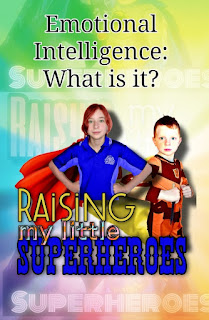Anyway back to Emotional Intelligence, one of the characters on the show, Paige, is there to interpret the world for the four geniuses that the show is based on, and throughout the four seasons, Paige assists all the characters to develop their emotional intelligence.
Emotional intelligence is a topic that I have been meaning to write a post about for some time, but I've never gotten around to penning a piece. After watching all four seasons of Scorpion, I figured that now is a good time to write that post.
Emotional intelligence is a skill that we have been assisting both little superheroes to develop since I can't remember when, and it's often a skill that many Autistic individuals struggle with.
Until recently L struggled to recognise and respond to his own emotions and those of others. O on the other hand was able to recognise emotions in others but struggled to recognise and respond to their own emotions.
So what is Emotional Intelligence?
Everyone has most likely heard of IQ or Intelligence Quotient. Emotional Intelligence, it is also known as EQ or Emotional Quotient, is the ability to understand, use, interpret and manage ones own emotions.
Your IQ can help you to achieve great things academically in life, but it is your EQ that will help you to manage your emotions, stress and interacting with others throughout your life. IQ and EQ exist in all of us in tandem and both are mroe effective when they work together.
Our emotions are important pieces of information that we feel every day of our lives that tell us not only about ourselves but also about others. It all comes down to our interoception sense - being able to recognise and respond to what our bodies are telling us.
Developing our own emotional intelligence, assists us in every aspect of our lives - we can learn to develop calming strategies when we become overwhelmed by our emotions. We can learn to manage our emotions in ways that are healthy for our mind and body. We can learn to recognise stress emotions in ourselves and develop calming skills.
As I have mentioned in other posts about developing our emotions, children aren't born with the ability to interpret and express how they are feeling. Recognising and responding to ones emotions is a skill that babies begin to develop from their interactions with their parents.
Developing emotional intelligence takes time, but if we start assisting our children with this skill when they are young, we are equipping them with skills that they can carry with them for life.
Assisting a child to develop their own emotional intelligence, begins with us. We need to be open about our own emotions, so that children don't become embarrassed about their own emotions.
There is still so much stigma in society associated with mental health issues - we need to teach our children that it is okay to be struggling mentally and that asking for assistance from others is the most effective way to manage their mental health issues.
If children are in a trusted environment where emotions are openly talked about, most children will speak freely about their feelings not only to their parents or carers but they may also be open to talking to others.
If we start these conversations early, we are giving our children the best start possible in life.



No comments:
Post a Comment
I would love to hear your thoughts on my blog. I do read all the comments that are posted. Thanks so much for stopping by. Jen xx